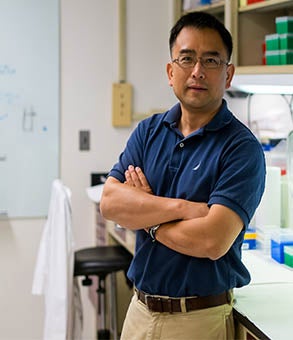Hang Yuan, PhD
Hang Yuan, PhD

Associate Professor, Director of HPV Biology Program
Department of Pathology
Email Hang.Yuan@georgetown.edu
Biosketch
HangYuanBio.download
Bio
Dr. Yuan received his PhD from Wake Forest School of Medicine. He started his postdoctoral training at Georgetown University Medical Center in 1998. Currently, he is an Associate Professor in the Department of Pathology. Dr. Yuan moved to Georgetown after the first-generation HPV vaccine was developed in Dr. Schlegel’s lab and became the group leader on vaccine development. His work, in collaboration with Bob Garcea at the University of Colorado, led to the second-generation cervical cancer vaccine, which can potentially cut production cost by 90%. This method led to a patent and it is hopeful that this second generation vaccine will be utilized in developing countries, where deaths from cervical cancer are most prevalent. This same technology was the basis of third generation vaccine studies which was funded by Gate’s Foundation (Grand Challenges in Global Health 2004-2009) and NIH (RAPID 2001-2003) and intended to combine a prophylactic with a therapeutic vaccine. In the course of his animal model studies, Dr. Yuan discovered and characterized Canine Papillomavirus type 2. This study and his subsequent work established himself as the leading expert in canine papillomavirus field. This canine model study has received an NIH R01 award. Dr. Yuan has also made significant contributions toward conditional reprogramming of epithelial cells research. He contributed to the finding that feeder cells are required for immortalization and he established 3D cultures for the CRC cells, thereby allowing the analysis of the differentiation potential of these cells. He has also demonstrated the tumorigenicity of the CRC tumor cells successfully in animals. More importantly, he successfully utilized conditionally reprogrammed cells to identify viral mutations in a rare case of HPV-induced lung tumors and used this to identify an effective therapy. The advance was seen as an exciting demonstration of the use of conditional reprogramming in personalized cancer medicine. His seminar presentation was awarded Geo von Krogh Prize by the Papillomavirus Society in the 27th International Papillomavirus Conference and Clinical Workshop (2011). The results were published on The New England Journal of Medicine in 2012, where Dr. Yuan was the first author.
